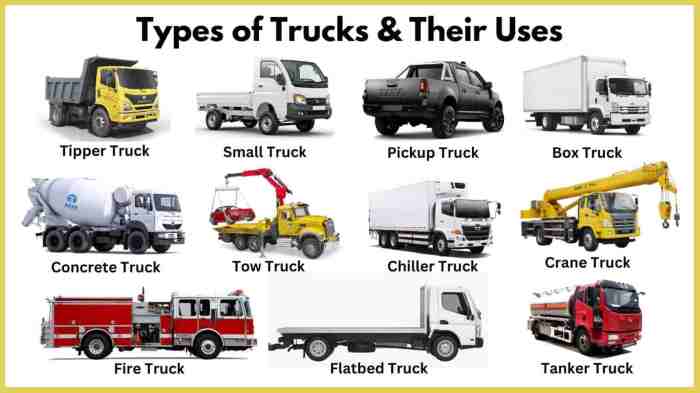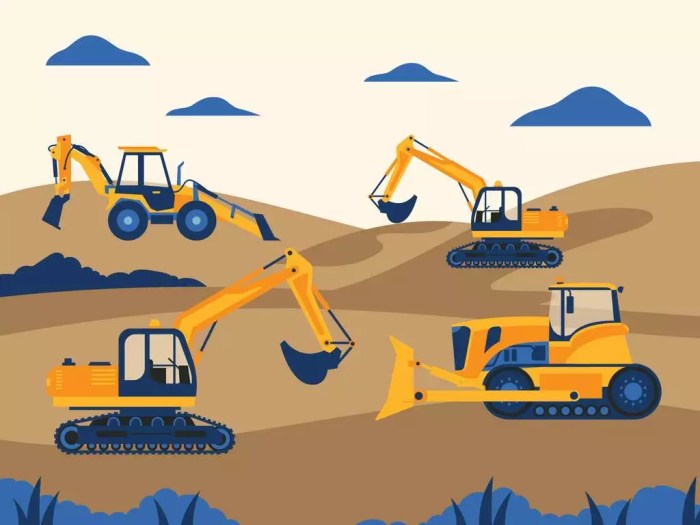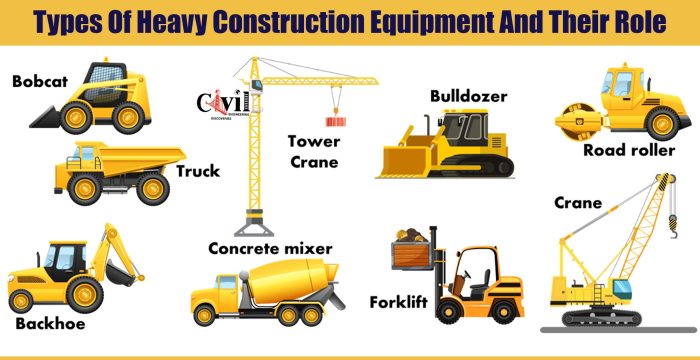Types of construction trucks and their uses set the foundation for efficient construction projects. From excavators to dump trucks and bulldozers, each vehicle plays a crucial role in the industry.
Understanding the specific features and functionalities of these trucks is essential for maximizing productivity and ensuring safety on construction sites.
Types of Construction Trucks

Construction trucks play a vital role in various construction projects, providing the necessary support for moving materials, digging, and transporting heavy loads. Let’s explore some common types of construction trucks and their specific features and uses.
Bulldozers
Bulldozers are heavy-duty construction trucks equipped with a large metal plate, known as a blade, in the front. They are used for pushing large quantities of soil, sand, or debris, and leveling the ground. Bulldozers are essential in projects involving land clearing, road construction, and building foundations.
Excavators
Excavators are versatile construction trucks with a rotating cab and a hydraulic arm with a bucket attachment. They are used for digging trenches, foundations, and holes, as well as for lifting heavy materials. Excavators are commonly seen in excavation projects, demolition sites, and utility installations.
Dump Trucks
Dump trucks are designed to transport loose materials such as sand, gravel, or debris. They feature a large open-box bed that can be tilted to unload the contents quickly. Dump trucks come in various sizes, from small pickups to large articulated trucks, and are used in construction sites for hauling materials to and from the site.
Cranes
Cranes are specialized construction trucks equipped with a hoist rope, wire ropes, or chains and sheaves to lift and lower heavy materials or equipment. They are commonly used in high-rise construction projects, bridge construction, and industrial installations. Cranes come in different types, including tower cranes, mobile cranes, and overhead cranes.
Concrete Mixers
Concrete mixers are trucks equipped with a rotating drum that mixes cement, water, and aggregates to produce concrete on-site. They are essential in construction projects that require a continuous supply of fresh concrete, such as building foundations, roads, and bridges. Concrete mixers come in different sizes to meet various project requirements.
Excavators
Excavators play a crucial role in construction projects by helping with tasks such as digging trenches, foundations, and holes, as well as handling materials and debris. They are versatile machines that can be used in various construction applications.
Types of Excavators
- Crawler Excavators: These excavators are equipped with tracks instead of wheels, providing excellent stability and traction on rough terrains. They are ideal for heavy-duty excavation work.
- Mini Excavators: Also known as compact excavators, these smaller machines are perfect for working in tight spaces or on smaller projects. They are highly maneuverable and can be easily transported.
- Wheeled Excavators: With wheels instead of tracks, these excavators are more mobile and suitable for jobs that require frequent relocation. They are often used in urban areas or on softer ground.
Attachments for Excavators
Excavators can be equipped with various attachments to enhance their capabilities:
- Bucket: The most common attachment used for digging and moving materials.
- Auger: Used for drilling holes in the ground, such as for fence posts or foundations.
- Grapple: Ideal for handling bulky materials like rocks, logs, or debris.
- Hydraulic Hammer: Used for breaking up concrete, rocks, or other hard surfaces.
Safety Considerations
When operating excavators on construction sites, safety should always be a top priority:
- Operators should be properly trained and certified to operate excavators.
- Always wear appropriate personal protective equipment, such as hard hats, gloves, and safety goggles.
- Inspect the machine before each use to ensure it is in good working condition.
- Follow proper operating procedures and never exceed the machine’s load capacity or reach limits.
- Be aware of your surroundings and watch out for obstacles, other workers, and underground utilities.
Dump Trucks

Dump trucks play a crucial role in construction projects by transporting and unloading materials efficiently. They come in various types and sizes to cater to different construction needs.
Types of Dump Trucks
- Standard Dump Trucks: These are the most common type, with a truck chassis and a dump body mounted to the frame.
- Articulated Dump Trucks: These have a hinge between the cab and the dump box, allowing for better maneuverability on rough terrains.
- Transfer Dump Trucks: These consist of a standard dump truck pulling a separate trailer with a movable cargo container.
Capacity and Suitability
- Dump trucks can range in capacity from 5 tons to over 100 tons, with larger trucks being suitable for heavy-duty construction tasks.
- Smaller dump trucks are ideal for residential construction projects, while larger ones are used in mining and major infrastructure projects.
Loading and Unloading Process, Types of construction trucks and their uses
- Materials are loaded into the dump truck using the dump body, which can be raised to dump the contents at the desired location.
- For unloading, the dump body is lifted, and gravity helps in discharging the materials onto the ground or into a designated area.
Construction Scenarios
- Excavation Projects: Dump trucks are essential for transporting soil, rocks, and debris away from the excavation site.
- Road Construction: They are used to haul asphalt, gravel, and other materials needed for road building.
- Demolition Sites: Dump trucks help in removing demolished materials and keeping the site clean and organized.
Bulldozers
Bulldozers are essential heavy equipment in the construction industry, primarily used for earthmoving, grading, and land clearing projects. These powerful machines are equipped with a large metal blade in the front that pushes soil, rocks, and debris.
Types of Bulldozers
Bulldozers come in two main types: crawler bulldozers and wheeled bulldozers. Crawler bulldozers, also known as track bulldozers, are equipped with continuous tracks that provide excellent traction and stability on rough terrains. Wheeled bulldozers, on the other hand, are more maneuverable and suitable for softer surfaces.
Advantages of Crawler Bulldozers
- Excellent traction on rough terrains
- Greater stability
- Can handle heavier loads
Advantages of Wheeled Bulldozers
- More maneuverable
- Lower ground pressure
- Can travel at higher speeds
Components and Features of a Bulldozer
Bulldozers consist of various components and features, including:
- Blade: The front metal blade used for pushing materials
- Cab: The operator’s compartment with controls and instrumentation
- Engine: Provides power to operate the bulldozer
- Tracks or wheels: Depending on the type of bulldozer
- Ripper: Optional attachment for breaking up hard ground
Maintenance Tips for Bulldozers
- Regularly check and change the engine oil and filters
- Inspect and maintain the undercarriage, including tracks or wheels
- Keep the blade sharp and in good condition
- Grease moving parts to prevent wear and tear
- Monitor hydraulic fluid levels and leaks
Ending Remarks: Types Of Construction Trucks And Their Uses

Exploring the diverse world of construction trucks unveils the intricate machinery behind successful construction ventures. Each vehicle, from excavators to bulldozers, contributes uniquely to the industry’s progress.
When it comes to construction projects, common construction defects can occur, causing delays and additional costs. However, there are solutions available to address these issues effectively. To learn more about common construction defects and their solutions, check out this informative article: Common construction defects and solutions.
Choosing the right construction materials is crucial for the success of any building project. There are various types of construction materials used in the industry, each with its own unique properties and applications. To explore the different types of construction materials commonly used, visit: Types of construction materials used.